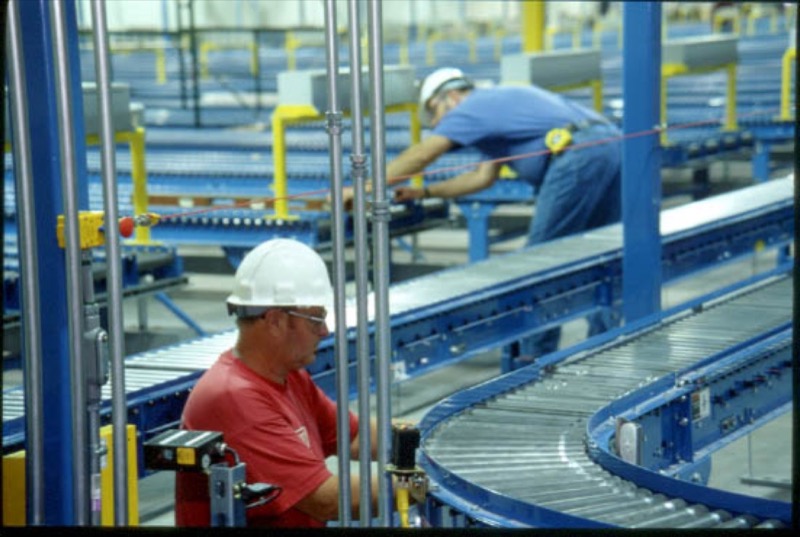Powered roller conveyors are a type of material handling equipment that uses powered rollers or wheels to move items or materials within a facility. These machines are particularly useful in situations where controlled and automated movement of goods is required for efficiency or safety.
They are ideal for companies looking to streamline their operations, improve their efficiency, and, most importantly, ensure the safety of their employees in the workplace. Whether you’re transporting delicate items requiring careful handling or bulky goods that need to be moved quickly and efficiently, powered roller conveyor equipment is a go-to option.
With decades of experience installing and refitting powered roller conveyors Storee Construction can help you integrate these systems into your material handling solution. Our experienced field personnel and project management team can help you maximize this equipment while limiting difficulties and downtimes during installation.
Types of Powered Roller Conveyors
Powered roller conveyors consist of a series of powered rollers that provide an efficient and reliable means of transporting products and materials from one point to another. The rollers are activated when needed, propelling the items forward without manual labor. They come in a variety of configurations, ranging from straight sections to curves, merges, and spurs, making them a highly versatile option.
Line shaft conveyors are a type of powered roller conveyor in which a central shaft is connected to multiple rollers via belts or chains. When the central shaft rotates, it drives the rollers, which then move items down the lines. Line shaft conveyors are known for their flexibility and ability to accommodate curves and changes in direction.
When it comes to moving heavy loads in manufacturing and pallet-handling settings, chain-driven roller conveyors are a great solution. These conveyors are designed to link heavy-duty rollers together with chains, with a motor providing the power that drives the chains and consequently, the rollers. The use of chains ensures that the load is both steady and stable as it moves along the conveyor.
Zero-pressure roller conveyors offer a solution to a common problem in logistics and distribution centers–minimizing product accumulation and pressure buildup between items. These conveyors use advanced sensors and controls to create gaps between items, preventing potential collisions and minimizing the risk of damage to products. The steady flow of materials ensures that warehouse operations run smoothly, increasing productivity, and reducing costs associated with product damage or delays.
For sorting, merging, and accumulation applications, live roller conveyors are a popular option. Powered by a belt or chain, these conveyors feature a series of mechanically operated rollers that expertly move products along the line. With the ability to customize the roller diameter and spacing, there’s no product too big or too small for a live roller conveyor to handle.
With accumulation roller conveyors, products can accumulate in designated zones along the conveyor while the rest of the items continue to move. This is especially useful in situations where downstream processes require a controlled flow of items, ensuring that no products are overloaded during the process. The ability to accumulate products in certain areas also helps to reduce bottlenecks and delays, allowing for a smoother and more efficient workflow.
Curved roller conveyors are designed to transport items around curves or corners while maintaining a continuous flow. They are commonly used in baggage handling systems at airports and in manufacturing facilities with limited floor space. Many of these powered roller conveyors can also be installed overhead with proper safety guides.
Powered Roller Material Handling machines are versatile and can be customized to suit specific material handling needs. They are widely used in industries such as logistics, manufacturing, and distribution to automate the movement of goods, increase efficiency, and reduce manual labor.
The choice of the right type of powered roller conveyor depends on factors like the type of materials being handled, the layout of the facility, and the desired level of automation. When you work with Storee Construction, we’ll perform an audit of your facility and engineer a material handling solution that will fit your processes and increase productivity and safety. Our local fabrication capability also allows us to add safety features and fit new equipment into your existing solution seamlessly.
REQUEST FREE CONSULTATION

